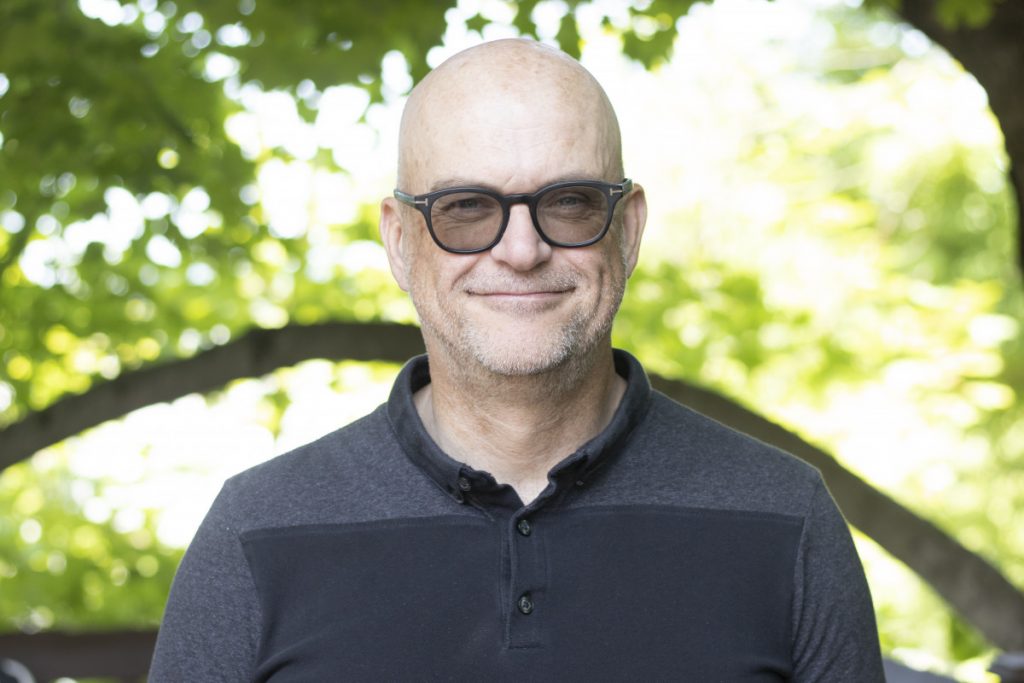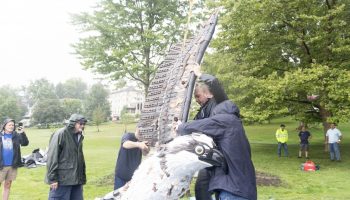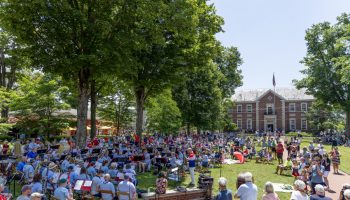Most Chautauquans owe their life, in part, to the fact that one or more of their antecedents survived the devastating 1918 influenza pandemic — the most severe pandemic in recent history, according to the Centers for Disease Control and Prevention.
Somehow, wherever they were, at least one parent, grandparent, great-grandparent, or great-great grandparent — depending on one’s age — lived through this pandemic as a child or young adult.
“There were 675,000 U.S. deaths, and it’s probably more because death records are a little loose,” said environmental historian and award-winning University of Georgia senior lecturer Brian A. Drake. “Conservative estimates around the world are easily 50 million dead, and conceivably 100 million.”
At a time when populations, from global to local, were typically far smaller than they are now, there were an astonishing number of deaths.
At 9:15 a.m. on Thursday, July 21, at the Chautauqua Women’s Club, Drake will give a talk for the CWC’s Chautauqua Speaks series, titled “The 1918 Flu Epidemic: Interactions with Race and Segregation.”

Drake, whose wife grew up in Bradford, Pennsylvania, and spent summers in Maple Springs, said that he knew about the Chautauqua Movement and has been coming to Chautauqua for about 10 years.
Hailing from Jackson, a city in south central Michigan near Ann Arbor, he earned his Bachelor of Liberal Arts in History at the University of Michigan.
“I always liked history,” Drake said. “When I was a kid I was a little history nerd — especially about World War II and the Civil War. I went to the library and read the encyclopedia. I loved the past. I used to love to go to graveyards because history is so tangible there. So all my degrees are in history.”
For Drake, “history is a great field for why things work. Is there a better field for that? I wanted to know why.”
No armchair academic, he worked as a Sierra Club subcontractor, an outdoor educator, in the Okefenokee Swamp, North America’s largest blackwater swamp. Via canoe, he guided visitors along the slow-moving river channel that flows through the peat-filled wetland deep within the southeastern conifer forest ecoregion.
Protected in large part by the Okefenokee National Wildlife Refuge and the Okefenokee Wilderness, this swamp straddles the Georgia-Florida border and serves as essential habitat for wading birds, songbirds, American alligators and the Florida black bear.
At 25, Drake entered the Franklin College of Arts and Sciences at the University of Georgia. There he wrote a thesis titled, “Saving the Dammed: Glen Canyon and the Rise of Environmentalism,” served as a graduate teaching assistant for courses in U.S. history and Western civilization, and completed his Master of Arts in U.S. history.
“I was really interested in the environmental movement,” Drake said. “I wanted to know why people became activists. Also, environmental lit — Edward Abbey, Thoreau and others.”
As a doctoral candidate and teaching assistant at the University of Kansas, Drake studied under Donald Worster, a renowned co-founder of the field of environmental history.
For his doctorate in environmental history, Drake wrote his dissertation about conservatives, libertarians and the post-WWII U.S. environmental movement.
Returning to the University of Georgia’s history department as a Franklin Postdoctoral Fellow and visiting assistant professor from 2007 to 2009, Drake taught courses in post-Civil War and post-WWII American history, U.S. environmental history, and environmental history of the modern world.
The 2007 to 2010 U.S. subprime mortgage crisis, which contributed to the 2007-08 global financial crisis, occurred at an inopportune time for Drake. He said that the University of Georgia’s subsequent hiring freeze meant that the only way he could be hired was as a non-tenure track lecturer.
“I teach more courses, but the expectations for publishing are less,” Drake said. “It’s both more work and less. I teach four courses a term — (at least) double the normal load. I need to revamp my U.S. environmental history syllabus because it’s a hot field that’s changing, and more is being written about it. Context is everything.”
For UGA students, Drake’s heavy load of content is welcome. Between 2014 and 2019, pre-COVID, he won a graduate faculty teaching award and an undergraduate teaching award, and was nominated for two others.
Then again, his book, Loving Nature, Fearing the State: Environmentalism and Antigovernment Politics Before Reagan, was selected for the Weyerhaeuser Environmental Series published by University of Washington Press.
“My first book is about people with environmental sympathies, but also with strong anti-government sympathies,” Drake said.
Because often it is the government that can protect the environment, Drake said, navigating this tension has been challenging.
Through the years, Drake has actively contributed to many scholarly conferences and written numerous book reviews and four book chapters. His articles have been published in Georgia Historical Quarterly, Great Plains Quarterly and Environmental History.
Drake is also the editor of a book published by University of Georgia Press, The Blue, the Gray, and the Green: Toward an Environmental History of the Civil War.
“In Georgia, I was at the start of a brand new field of the Civil War environment,” he said. “It’s more than war being fought outside. It’s about disease, weather, climate, agriculture. How they shape battles and the experience at large.”
He continued: “For a bright, shiny moment, I was on the cutting edge. Now (there is) lots of interest and I’m not a Civil War historian, so I’m out of my depth there.”
The Blue, the Gray, and the Green led to Drake’s research on the 1918 flu epidemic.
“The environment is affected by disease,” he said. “Native populations being killed by disease — … the Columbian Exchange is the best example. You cannot do American history without that. I was interested in the 1918 flu — before COVID — because it’s the best modern example of a pandemic.”
Lacking the funding to travel around the United States, Drake said he decided to focus on his backyard: Athens, Georgia.
“The irony was, COVID kept me out of the archives and library,” he said. “(My next book) probably will become a book about Georgia and the flu.”
To some extent, Drake’s talk at the CWC will discuss community studies about this epidemic. He said there is only one, about southern Massachusetts, that covers the flu from beginning to end: Influenza and Inequality: One Town’s Tragic Response to the Great Epidemic of 1918, by Patricia J. Fanning.
“I thought, no one’s done the South,” Drake said. “It’s incomplete. There’s stuff I don’t know.”
Consequently, he will also talk about the research process, including in the archives and library.
According to Drake, UGA has one of the best libraries in the South. In addition to being a government document depository, it houses the Richard B. Russell Jr. Special Collections Libraries, including a massive underground vault.
To learn more about the far-reaching 1918 flu, environmental history and hands-on historical research from an outstanding university lecturer, the Women’s Club is the place to be on Thursday morning.




